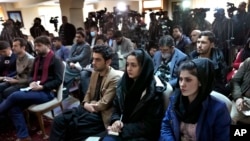A court in Afghanistan has sentenced a journalist to one year in prison on charges that free press advocates say included criticism of the Taliban government in his social media posts and "espionage." A Taliban spokesman said he was sentenced for “criminal misconduct.”
Khalid Qaderi, a poet and reporter with Radio Nowruz in the western Afghan city of Herat, has been in custody since his arrest in mid-March. The International Federation of Journalists (IFJ) alleged in a statement issued Thursday that he was tried and sentenced last week by a Taliban military court, something the Taliban denied.
The IFJ said the young Afghan journalist was accused of posting content critical of the Taliban, including his radio broadcasts, on Facebook. It quoted Qaderi telling the court, "I realized my errors, and I deleted the posts from my Facebook page."
The IFJ denounced what it said was "the arbitrary sentencing" and urged the Islamist Taliban to cease their persecution of journalists for their independent reportage. This would be the first reported case of a journalist being tried by a military court since the Taliban seized power in Afghanistan last August.
Taliban spokesman Zabihullah Mujahid on Thursday confirmed the sentencing of the journalist but insisted Qaderi's arrest had nothing to do with his "journalistic work," nor was he tried by a military court.
Mujahid claimed while speaking to VOA’s Afghan Service that a "civil" court in Herat had imposed the sentence on Qaderi for "criminal misconduct." The spokesman did not elaborate.
"Under Taliban rule," the IFJ said, “Afghan journalists have continued to face draconian restrictions, threats to freedom and arbitrary arrests.” The group called for the Taliban to immediately release the journalist from prison.
The Taliban insist they support media activities in Afghanistan within the law, but an estimated 1,000 journalists have fled the country since the Islamist group returned to power almost nine months ago, citing threats, harsh restrictions on media and economic upheavals.
Meanwhile, the U.S. Commission on International Religious Freedom (USCIRF) said in a report issued Thursday that the Taliban continue to persecute religious minorities and punish Afghans in accordance with the group's extreme interpretation of Islamic law or Sharia.
"The Taliban takeover and U.S. withdrawal from Afghanistan in August 2021 led to a mass exodus, heightened by a violent crackdown on civil society, targeted killings, beatings and detentions, severe restrictions on women's rights, diminished local media presence, and an increase in violent, targeted attacks claimed by Islamic State Khorasan (ISIS-K)," the U.S. government entity said.
The USCIRF monitors the conditions of refugees who have fled severe violations of religious freedom and the U.S. government's policy responses.
Women's rights
Last week, the Taliban government decreed that women must fully cover their faces and bodies when in public, ideally with the traditional all-covering burqa, in one of the harshest restrictions the Islamist group has imposed on Afghan women since seizing power.
The edict advised women to leave their homes only in cases of necessity and warned that violations could lead to the punishment of their male relatives. The move drew widespread international condemnation and demands for its reversal.
The Taliban defended the female dress code, saying it is in line with Islamic and Afghan traditions. The group also has not yet allowed secondary schoolgirls to resume classes, ignoring domestic and international demands to lift the ban.
The United Nations Assistance Mission in Afghanistan (UNAMA) said Thursday that its chief, Deborah Lyons, in a series of meetings with Taliban leaders this week, called on them to respect and ensure women's fundamental rights.
"The international community's ability to engage with the Taliban as credible actors requires them to make good on commitments for all girls to return to school, as well as to ensure women can work, access basic services and have free movement without impediments," UNAMA wrote on Twitter.




